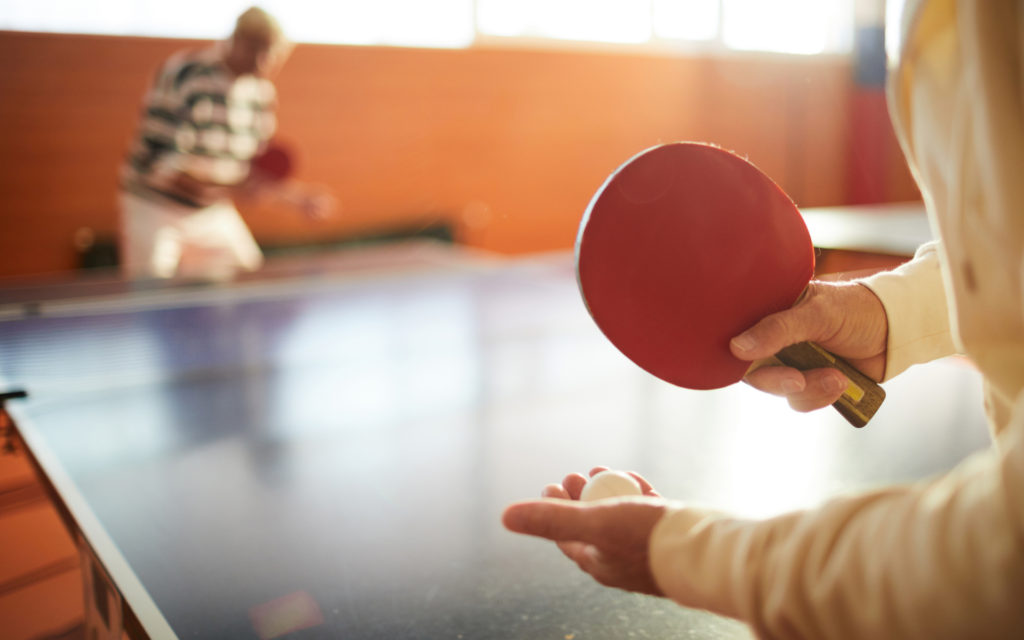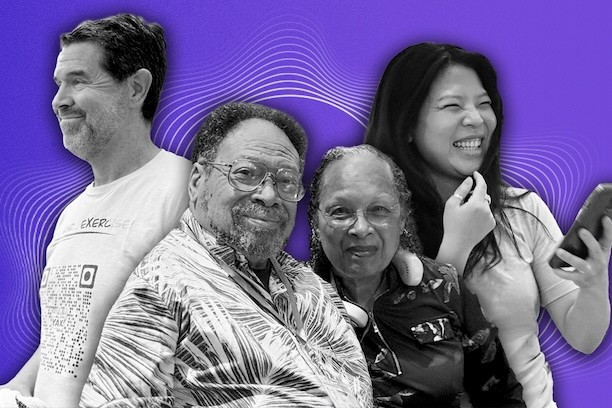Receiving the diagnosis of Parkinson’s disease about ten years ago was a life altering experience which made my long-term love affair with the game of ping pong even stronger. “Damn, I love this game,” I often think, noting the rhythm, pace, and high-eye coordination of the fast-moving game does something to regulate my nervous system, to soothe the stiffness and connect movement in my body. Its competitive nature also stimulates natural, survival-based “fight” responses and invites the expression of what I call “healthy aggression.” This is an added gift for someone like me who has had trouble feeling appropriate anger throughout my life.
All of these benefits make the game like therapy for me and tempt me to recruit a fellow player at all times – morning, noon, or night. When my body feels stiff and I can barely move, I crave a paddle in my hand and any one of my ping pong pals to join me in my garage. This is where my beautiful and beloved ping pong table resides. It feels like magic as I start moving quickly in synchronistic rhythm, feel energy flowing in my body and soon the extreme stiffness is forgotten.
Since I’m often trying to recruit someone to play ping pong with, I am most fortunate to live on an active street a few blocks from the beach and a well-known surf break. On especially sunny and beautiful weekends a steady stream of people can be seen driving golf carts, biking, and walking to and from the beach. They pass by my house, with the garage doors often open, and among the surfboards, wetsuits, and assorted beach items, they can see me and a friend in an animated game of ping pong. Although focused on calling out scores, grunting at missed shots and cheering the great ones, I notice the people passing by, and those who also love ping pong often shout out “you guys are really good; can I hit a few with you?” I’ve actually made a couple of ping pong friends this way!
The love affair with ping pong began as a child. My siblings and I would make bets on games played with our old weather-beaten backyard table. My brother would conjure up various consequences for the loser and yell them out. Sixty years later my sister and I still play; I almost always beat her and she calls me “the queen of ping pong.” Back in high school, my group of friends played for hours at a time in the upstairs family room of my boyfriend’s house. I would look at my best friend and say, “Okay, let’s take these guys down.” A decade later, as full time working parents, we often gathered with friends for a barbecue and the ping pong tables in numerous backyards always beckoned me over. I
played vigorously with the guys, typically as the only woman, and I could hear a few of them muttering, “She’s a beast!” At some point when my husband and I were shopping to buy a new home, I clearly told him, “If there’s no space for a ping pong table, there’s no deal.”
Now retired, several days a week I play with my ping-pong club. These pals are ping pong aficionados who love the game as much as I do. A blue tooth speaker plays old rock and roll tunes and music fills our spacious outdoor covered space. There is action at all four tables with doubles or singles, and you can hear on-going shouts of triumph when a long rally ends with a climactic winning shot. Collective joy for the game is keenly present, and the camaraderie is felt.
Parkinson’s is not the greatest thing, although it’s not the descent into decline I originally thought it would be. I don’t typically complain, but it’s not a pleasant reality to feel so stiff and unable to move with ease a fair amount of the time. Recently I read an apt description by Sue Miller in her novel The Distinguished Guest of what my condition feels like: “as if there is a tree trunk growing inside my body.” I would add that the tree trunk continually squeezes and fills up space, so I can barely move. There are lots of variables at play to make these symptoms change from good to bad and back to good, like amount of sleep, stress, medicine on and off times, nutrition and exercise. Adding to this, the side effect of the main medication I take produces an involuntary movement of the upper body called Dyskinesia (I call it “bopping around”), and it is very annoying.
Now that I’ve reached the threshold for complaining, I return to my positive attitude and honor the major commitment I make to keep moving with multiple daily exercise activities. In addition to ping pong, this includes numerous hours of walking, hiking, reformer pilates, and yoga. I’m also drawn to a myriad of interesting involvements to keep my brain stimulated and my heart warmed, including taking classes, writing, making videos, volunteer work, participation in Parkinsons research, and spending time with family and friends. Most people still can’t tell I have Parkinsons, and fortunately for me, my gratitude and zest for life have not diminished because of it.
Help people with a diagnosis find exercise communities with a gift to PMD Alliance.
Ilene Blaisch, recently retired after 42 years as a Licensed Clinical Social Worker/Psychotherapist, is a resident of San Clemente, CA. Diagnosed with Parkinson’s Disease in 2014, Ilene has been committed to keeping herself as healthy as possible with plenty of exercise, meaningful activities and a positive, yet accepting, attitude about her condition.
Click here to watch Ilene tell her story of Parkinson’s at the Dana Point “DO TELL” Storytelling event in 2023.


